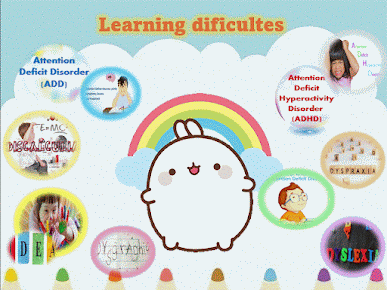Attention Deficit Disorder (ADD): is a chronic condition that affects millions of children and often continues into adulthood. ADHD includes a combination of persistent problems, such as difficulty maintaining attention, hyperactivity and impulsive behavior.
Attention Deficit Hyperactivity Disorder (ADHD): People with ADHD may have problems paying attention, controlling impulsive behaviors (they may act without thinking about the outcome of their actions), or they may be overly active. Although ADHD cannot be cured, it can be effectively managed and some symptoms may improve as the child gets older.
dyscalculia: Dyscalculia, or mathematics learning disability (MAD), is a learning disability, specific to mathematics, which is the equivalent of dyslexia. In this case, it affects correct numerical processing and calculation, and is known as 'number dyslexia.
Dysgraphia: Dysgraphia refers to a number of specific writing challenges. It affects skills needed for handwriting, typing and spelling. There are many ways to help kids with dysgraphia improve their handwriting.
Dyspraxia: refers to problems with movement. The term dyspraxia has been used for a long time, but it is not an official diagnosis. There are many ways to help children improve their motor skills.
Learning Disability (LD)
A specific learning disability can cause a person to have difficulty learning and using certain skills. The skills most often affected are reading, spelling, listening, speaking, reasoning, and math.















No hay comentarios.:
Publicar un comentario